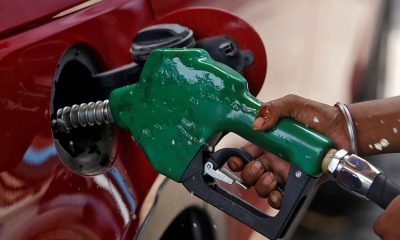Business
PH refinery to begin producing 12-million-litre petrol daily this month — Marketers

PH refinery to begin producing 12-million-litre petrol daily this month — Marketers
The Independent Petroleum Marketers Association of Nigeria (IPMAN) has announced that the Port Harcourt refinery is on track to meet its August deadline for producing petroleum products and will be able to supply 10 to 12 million liters of petrol to marketers.
The National Operations Controller of IPMAN, Zarma Mustapha, made this statement in an interview with Channels TV on Thursday.
Mustapha said the refinery will boost the supply of petroleum products in the country to about 11 to 15 million liters daily, and help ensure energy availability across the board.
According to him, the refinery is set to operate independently and sell at the prevailing market price with little or no government interference.
“There is this understanding that the Port Harcourt refinery is going to perform independently and sell at whatever prevailing market price for them to recover their cost.
“It is not going to be run like a government entity as it has been before. I believe that the refinery coming up, will really boost the demand and supply of PMS to nothing less than 11 to 15 million litres daily.
READ ALSO:
- Tunde Bakare to FG: You can’t be feeding fat and asking citizens to tighten belts
- FG suspends planned sale of 50kg bag of rice to civil servants at N40K
- Updated: Two persons burnt, seven vehicles razed in Lagos filling station explosion
“I am confident and optimistic that this August deadline is going to be a realistic deadline. It will come on stream and fully produce all the necessary components that the refinery is supposed to produce. At least, at its capacity of 0,000 barrels, can give you 10 to 12 million litres of PMS,” he said.
Commenting on whether the refinery will help reduce the price of petrol in the country, Mustapha said that might be the case if the operators decide to sell at a subsided rate.
He, however, explained that the refinery has to recover its cost of operation, particularly the $1.5 billion loan it obtained from a creditor for its maintenance in 2021.
Accordingly, the spokesperson of the marketer said since the operators are also buying crude at an international price, they will have to recover their cost also.
“It depends on how much they are willing to sell. How much did they get the crude? Because they’re buying the crude at an international price too. They have to pay back the loan they took also.
“The $1.5 billion is a loan they took from one of these African financial institutions. I don’t know which one among them. They took the loan with the promise of paying back with whatever recoup from the earnings of the refinery,” he added.
PH refinery to begin producing 12-million-litre petrol daily this month — Marketers
Business
External reserves at risk over fuel subsidy removal, rising debt servicing – CBN

External reserves at risk over fuel subsidy removal, rising debt servicing – CBN
The Central Bank of Nigeria has said that fuel subsidy removal and increase in debt servicing obligations could pose downside risks for the growth of external reserves by 2024/2025.
The apex bank disclosed this in its Monetary, Credit, Foreign Trade and Exchange Policy guidelines for fiscal years 2024/2025.
However, the CBN in its outlook projected a positive economic output growth in Nigeria by 2024/2025 based on continued policy support in the agriculture and oil sectors, reforms in the foreign exchange market, and the effective implementation of the Finance Act 2023 and the 2022-2025 Medium-Term National Development Plan (MTNDP).
The CBN said, “The outlook for Nigeria’s external sector in 2024/2025 is optimistic, on the expectation of favorable terms of trade, occasioned by sustained rally in crude oil prices and an improvement in domestic crude oil production.
“The positive outlook is supported by the sustenance of crude oil price, propelled by the decision to cut production, and gains from capital flows and remittances.
“However, lower crude oil earnings, fuel subsidy removal, rising import bills, and increased external debt servicing obligations could pose downside risks for the accretion to external reserves.
“In addition, the sustained monetary policy tightening by central banks across advanced economies increases the risk of capital outflow.”
On Nigeria’s output growth, CBN said, “Nigeria’s output growth is expected to maintain a positive trajectory in 2024/2025.
“The growth prospects are dependent on continued policy support in the agriculture and oil sectors, reforms in the foreign exchange market, and the effective implementation of the Finance Act 2023 and the 2022-2025 MTNDP.
“The risk to the outlook is still tilted to the downside, characterized by significant headwinds such as rising energy prices emanating from lingering effects of the Russia-Ukraine war, and the persisting security and infrastructural challenges, which could undermine the growth outlook in the short to medium term.
“Domestic prices are expected to remain elevated through 2024/2025, on the back of spillovers from global supply constraints, and exchange rate pass-through.
“More so, the persisting security and infrastructural challenges could exacerbate inflationary pressures.”
Business
Dangote Refinery hasn’t received full operational licence – NMDPRA

Dangote Refinery hasn’t received full operational licence – NMDPRA
Africa’s largest refinery, the Dangote Petroleum Refinery, has not yet been granted a full operational licence, according to the Nigerian Midstream and Downstream Petroleum Regulatory Authority (NMDPRA).
George Ene-Ita, Head of Public Affairs at NMDPRA, revealed that the refinery, which has a capacity of 650,000 barrels per day, remains in its pre-commissioning phase.
The refinery is undergoing a phased process, with only two out of four priority sections having received approval for the introduction of hydrocarbons.
This update highlights that while the refinery is making progress, it has not yet completed the necessary regulatory steps to commence full operations.
“The entire plant is subdivided into four sections technically referred to as priorities one, two, three, and four.
“At this stage of pre-commissioning, only priorities one and two have been given approval to introduce hydrocarbons, which allows the plant to operate on a test-run basis,” Ene-Ita told The Guardian.
Considering the refinery’s stages of approval, the NMDPRA said the refinery only has permission to produce petroleum products like diesel, jet fuel, and kerosene.
READ ALSO:
- JAMB gives reasons for limiting physical interaction with underaged candidates
- Tension in Kano, Ganduje reportedly plots to dethrone Emir Sanusi again
- I’m a rapist, admits husband who drugged, abused wife for 10 years
According to the regulator, only the approved products are permitted to be released into the Nigerian market under its regulatory supervision.
Ene-Ita said the audits to be undergone by the refinery include tests on the plant’s mechanical, electrical, and instrumentation systems, an action to ensure the refinery’s preparedness for full-scale production.
He added that full production and an increased volume of PMS would only be achieved when approval is given to introduce hydrocarbons into priorities three and four.
He said, “Once these sections are operational, the plant will undergo a 90-day observation period during which additional tests and audits will be carried out to confirm compliance with regulatory guidelines. If, after 90 days, our technical team confirms that the facility adheres to all parameters, the refinery will be issued a License to Operate (LTO), marking its full operational status.”
Ene-Ita also reacted to the concerns over the colour of PMS produced during the pre-commissioning phase.
He explained that the Nigeria Industrial Standards (NIS) specified colour for PMS is Oxblood Red.
He said the refinery is not fully operational, adding that the colour may not conform to NIS standards until it is fully operational.
“It’s important to note that colour is not necessarily an indicator of product quality, nor is it a quality parameter in regulatory compliance. When the Dangote Refinery becomes fully operational, it will be expected to produce PMS that conforms to the NIS colour specifications,” added Ene-Ita.
Dangote Refinery hasn’t received full operational licence – NMDPRA
Business
Dangote refinery to transport 75% of fuel locally by sea

Dangote refinery to transport 75% of fuel locally by sea
Dangote Refinery is set to transport 75% of its local petroleum product supply through sea routes.
Indeed, it said products for Calabar, Port Harcourt, Warri, Apapa and Atlas would mainly move by sea, with road transport reserved for urgent needs.
Vice President of Dangote Industries Limited, Devakumar Edwin, disclosed this in an interview with Arise News.
He said this would ease the pressure on road infrastructure.
This is coming as the refinery began distributing Premium Motor Spirit popularly called petrol on Sunday.
The sea transport option is considered despite the company’s capacity to load 83% of its products by road.
Edwin also said that the shift to sea transportation aimed to reduce the higher costs associated with road distribution.
He said as the largest single-train refinery globally, Dangote Refinery offers both sea and road export options.
He added that the oil firm decided to evacuate nearly all production by sea for strategic reasons.
Edwin said, “We have both exporting facilities by sea and by road. 75% of the production can be evacuated through sea. In fact, now we are ramping up to make it even 100%.
“Anything going to Calabar, Port Harcourt, Warri, Apapa, Atlas can all be taken through the sea. So only what is imminently required by road can be taken.
“But I also have the facility to load 83% of my production through road. We have just built-in flexibility but we can avoid all traffic congestion on the road by evacuating through sea and it will also bring down the cost of transhipment.”
He further noted that most products destined for central Nigeria could be shipped from Port Harcourt and Warri, while those for the East and North-East could be moved from Calabar.
To avoid congestion where Dangote refinery is located, the Lagos State Government has announced that the electronic call-up (e-call-up) system will be activated on the Lekki-Epe corridor from September 23, 2024, after a previously scheduled launch in August was postponed.
-

 metro3 days ago
metro3 days agoFG begins free CNG conversion in three Ogun centres
-

 Business3 days ago
Business3 days agoPetrol: Dangote pump price emerges as NNPC trucks begin loading
-

 Business18 hours ago
Business18 hours agoDangote refinery to transport 75% of fuel locally by sea
-

 News3 days ago
News3 days agoDangote fuel supply forces Scotland refinery to announce shutdown date
-

 Politics3 days ago
Politics3 days agoI never said I’d be VP to anyone in 2027 – Peter Obi
-

 metro8 hours ago
metro8 hours agoFour burnt to death, eight others injured in Ore-Ijebu Ode road crash
-

 metro3 days ago
metro3 days agoMen beware – Lack of sex can make your wife miserable, angry
-

 Aviation3 days ago
Aviation3 days agoAir traffic controllers threaten to ground Nigeria’s airports Wednesday







